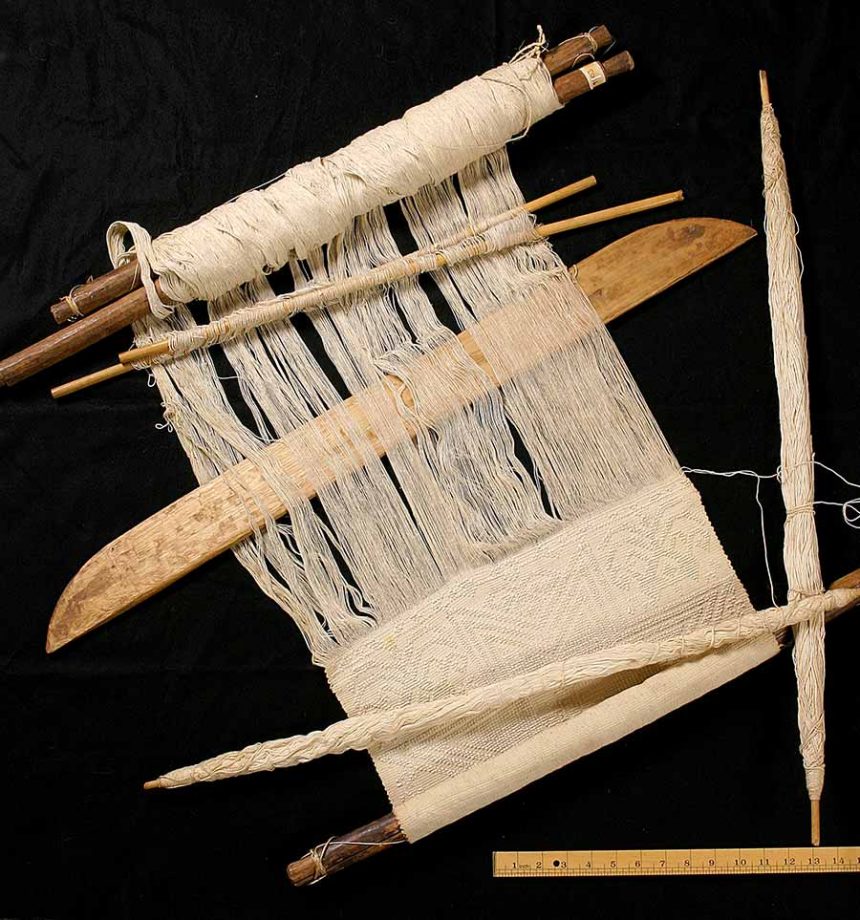
TEXTILE SOCIETY EVENT
The Textile Society Annual Conference 2021 explores the theme of ‘Tools’ – their significance in the history of textiles and their influence on contemporary practice. From the simplicity of a darning needle held in the back pocket to the complexity of an industrial power loom, tools are the extension of our creativity, a connection between thinking and making, imagination and invention.
We are delighted to welcome our panel of eminent speakers who will bring to this event their knowledge of textiles and their personal experiences of the tools that created them.

Will Cruickshank
Will Cruickshank has a multidisciplinary practice which includes textiles, sculpture, film, photography, and printmaking, alongside machines and participatory works. In 2018-2019 he received the Arts Council England DYCP Award (Developing your Creative Practice) for his studio research. For five years Will rented three grain silos in Essex, and converted them into a studio where the spaces operated as laboratories and machine rooms. He has now relocated to Devon.
Will’s presentation will include images and films of his recent work in textiles – a record of an explorative journey through machine, material and technique, and an insight into how the evolution of his work is dependent upon the invention, or reappropriation, of devices and tools.
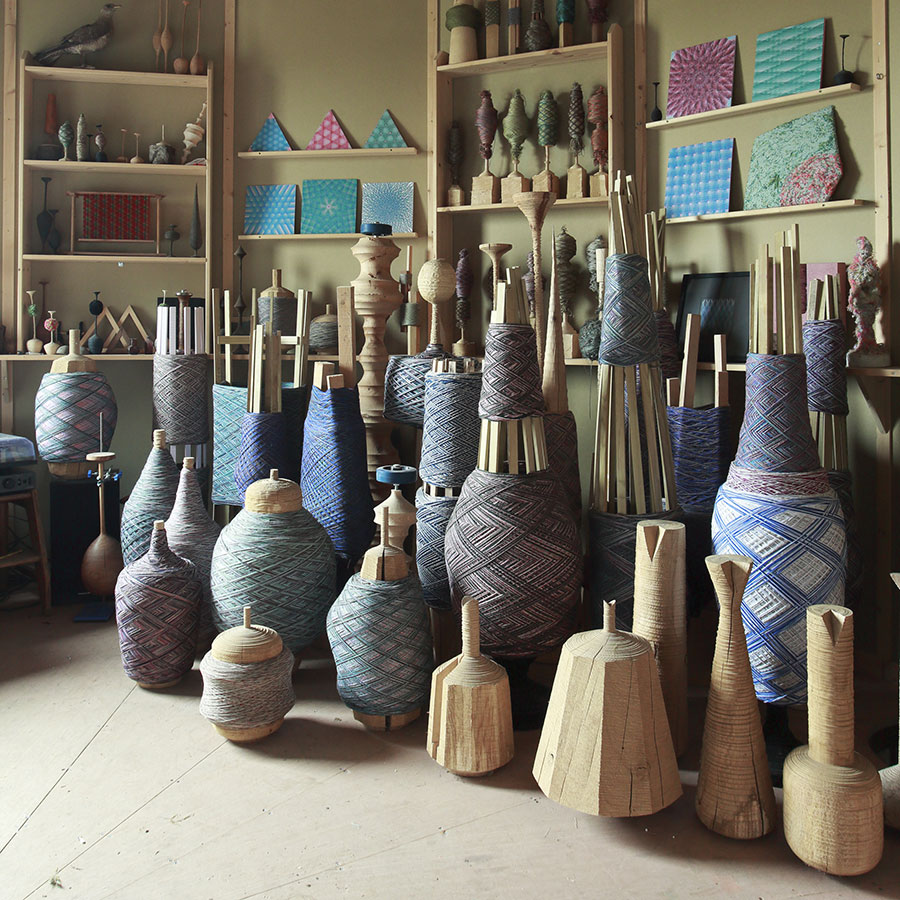
Silo Studio
I have been working as an artist for twenty years, creating objects through the development of self-built machinery and experimental production. It is a practice grounded in learning by doing, and thinking through making.
Daniel Harris
Daniel Harris established the London Cloth Company ten years ago – the first micro-mill to produce bespoke cloth in the capital. He specialises in quality woven cloth produced on his ever-expanding range of carefully restored shuttle looms, employing the same techniques that have not changed for decades. Clients range from Ally Capellino to Hardy Amies, from Lyle and Scott to Ralph Lauren.
Daniel will discuss his business which started as one 1920s loom in a small studio, and has gone on to encompass a sixty ton collection of restored working textile machinery dating from 1880-1990. It is a collection with the ability to weave fabrics of different qualities, supplying brands all over the world.
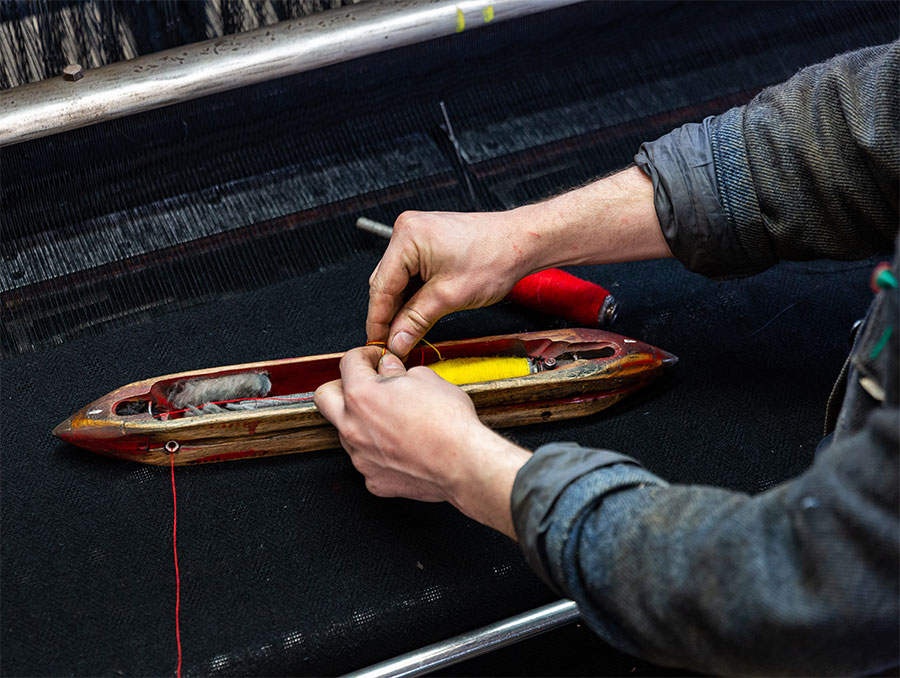
London Cloth Company, Shuttle
When I started weaving I was ridiculously naive, all I was going to need was a loom. But weaving on an industrial scale, no matter how small, requires so much stuff!…the ludicrous amount of ancillary equipment and spares needed to restore, repair and maintain ageing machinery.
Tim Parry-Williams
Tim Parry-Williams is a studio weaver and Professor of Art: Textiles at the University of Bergen, Norway. He is a Trustee of the Crafts Study Centre and an Advisor to the European Textile Network (ETN). His collaborative exhibition project Plain Stripe Check opened at the Japan Folk Crafts Museum, Tokyo in 2007. It went on to tour the UK and Europe, drawing upon research with a network of museums and archive collections worldwide.
Tim’s portfolio career is centred on weaving – working by hand, indirectly through collaborative practice, in education and through cultural exchange. Opening and reaching into both literal and metaphorical toolboxes, Tim will reveal examples of the many objects employed in a largely autonomous practice, very much rooted in a rich, craft-based training, first in England and later in Japan.
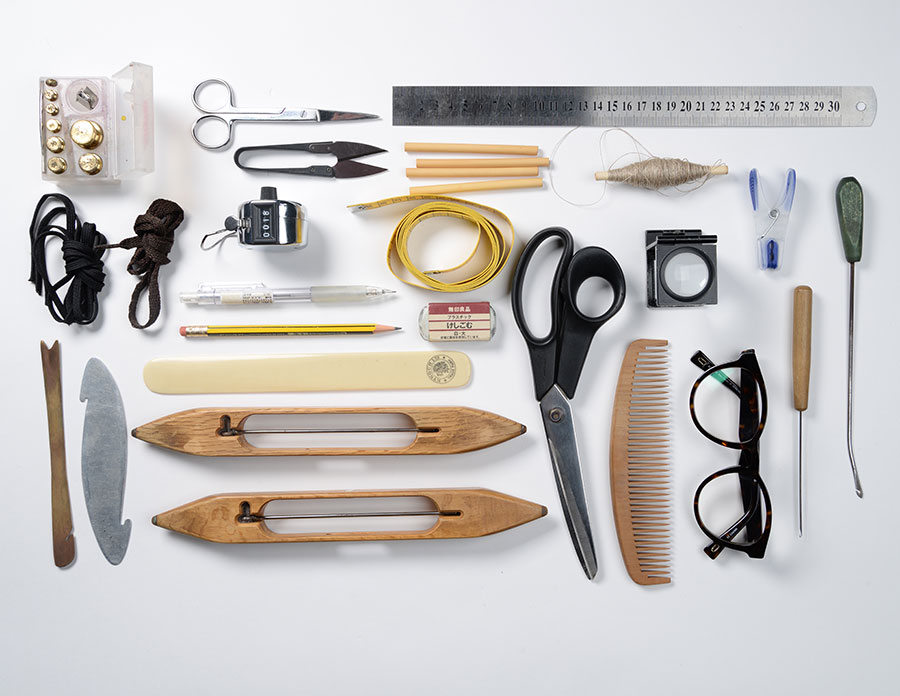
Facilitating, Photo Nathan Corum, 2021
My practices are punctuated by the need to solve problems, to question and reinvent. The toolbox shifts from the specific, the specialist, and the custom-made to embrace the adapted, doctored, re-purposed, and re-appropriated…a delightfully disparate and eclectic gathering of objects – the ‘tools of the trade’ as extensions to both body and mind, or simply the means to an end in the act of making and expression.
Celia Pym
Celia Pym is an artist and Visiting Lecturer in Mixed Media Textiles at the Royal College of Art, London. In 2017 she was shortlisted for the Woman’s Hour Craft Prize and the inaugural Loewe Craft Prize. Her work has been exhibited internationally most recently in Waste Age, Design Museum London (2021), On Happiness: Joy and Tranquility, Wellcome Collection, London (2021), Siblings, Trading Museum, CDG, Paris (2020) and Sewing Box for the Future, V&A Dundee (2020).
For the past fifteen years Celia has explored damage and repair in textiles – tracking down owners of garments, and using the question, “Do you have something with a hole in?” to meet people and invite conversation wider than just the damaged item.
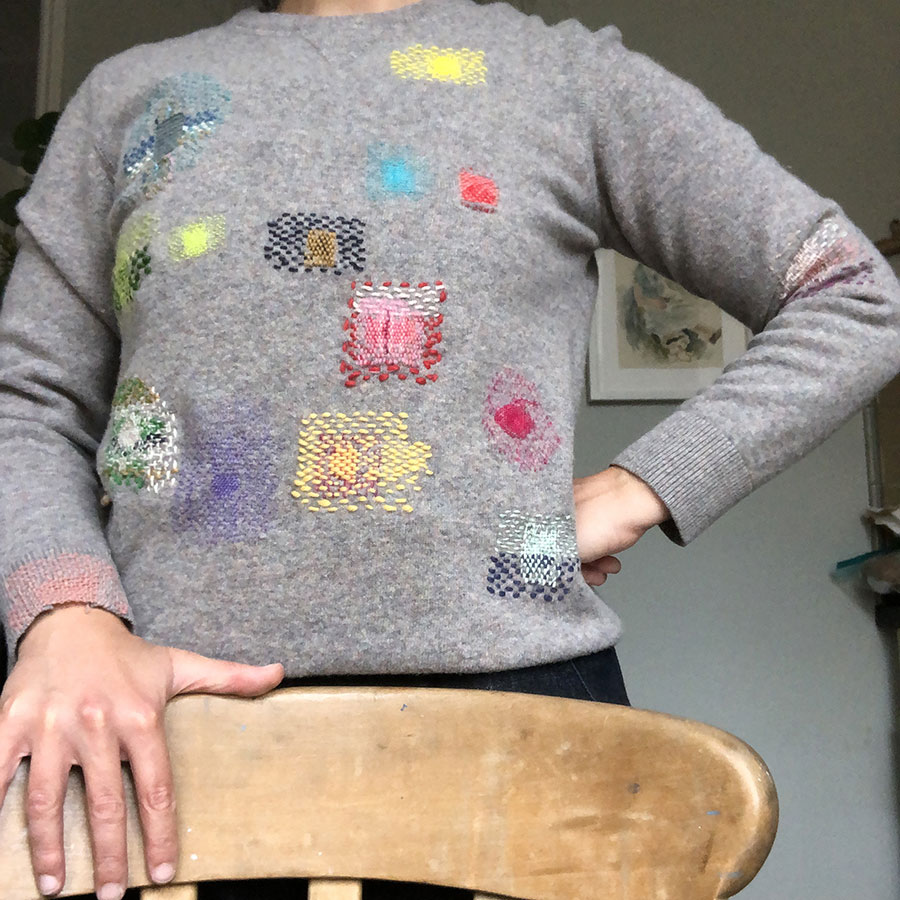
Practice Sweater
Simple tools are essential to make the conversation happen. Damage and repair is complicated, but starting with tools that fit in your pocket makes it easier. I favour tools that are lightweight and portable. Scissors, needles – both knitting and sewing – and an old fork are the perfect combination of tools for me.
Mary Schoeser
Mary Schoeser FRSA is an Honorary Senior Research Fellow at the V&A and President of the Textile Society, with fifty years of experience in writing, curating, lecturing and archival work. Among her 2021 projects are contributions to the exhibition Chintz: Cotton in Bloom (Fashion & Textile Museum) and an essay for the Archie Brennan: Tapestry goes Pop (Dovecot Studios) catalogue, as well as a chapter for a forthcoming publication on Bernat Klein. She is Patron of the Klein Foundation and the School of Textiles.
Taking tools for making textiles as a starting point, Mary’s lecture will explore what early archaeological finds tell us about how and what early humans created. Aside from examining surviving tools, her discussion will widen out to embrace a definition of ‘tool’ given by the Oxford English Dictionary, namely ‘…a thing (concrete or abstract) with which some operation is performed; a means of effecting something; an instrument.’
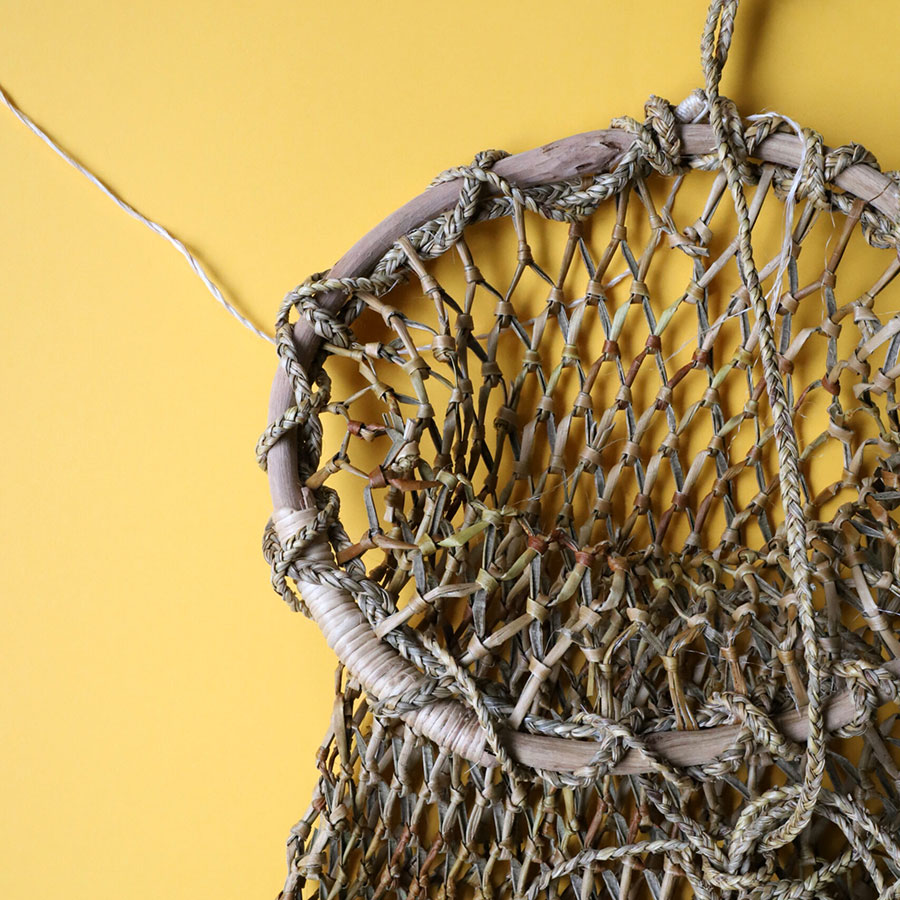
Matthew McIntyre Wilson, Pēke mau net 2020, Photo Natalie Jones
Embracing textiles as tools in and of themselves, as implements and communicative devices, shows the links between herding and accounting, storage and story-telling – a journey through the effects of textiles.
Dr Brenda King, long-standing Committee Member and Chair of the Textile Society for a decade, has been instrumental in co-curating this event. Brenda died suddenly on 4 July 2021 and, as such, this conference is dedicated to Brenda in sincere gratitude for all her work and commitment to this Society over many years.
Click here to purchase your member ticket via Eventbrite.
Click here to purchase your non-member ticket via Eventbrite.



